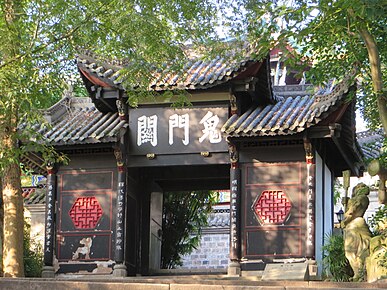Gate of the Ghosts

| Part of a series on |
| Chinese folk religion |
|---|
 |
The Gate of the Ghosts[2] (simplified Chinese: 鬼门关; traditional Chinese: 鬼門關; pinyin: Guǐmén guān), or Devil's Gate,[3] Demon Gate,[4] known as Guimen guan in Chinese,[5] is a pass in the Underworld in Chinese mythology.[6]
The gate is a pailou[7] with the words "Gate of the Ghosts" written on the horizontal plaque.[8] Legend has it that on their way to the Ghost Country, the dead must pass through this gate.[9]
Use of the Gate
The Gate of the Ghosts plays a significant role during the Ghost Festival, which is celebrated in the seventh month of the lunar calendar in Asian countries such as China.[10] According to Chinese mythology, every year on July 1, the King of Hell opens the Gates of the Ghosts to allow those who have suffered and been imprisoned in hell to exit there.[11] The ghosts have a shortchance to wander on earth and enjoy the living world. The gate closes at the end of July, which is therefore considered an unlucky month. Tradition says that people should neither get married or move to a new home during July.[10]
Traditionally, during this time, people would worship and conjure their deceased relatives by burning money, ingots and paper candles, putting up river lanterns, and in other ways to pray for the blessing of the ancestors. These actions are believed to help eliminate disasters and increase blessings, or to save the dead and resolve grievances.[11] Today, the Ghost Festival has become a traditional virtue of filial piety in Chinese culture. Inhabitants of Northern China still burn paper money during the festival to pay homage to their ancestors and express their longing for their loved ones.[10]
References
- ^ "File:Gates of Hell at Fengdu Ghost City.JPG - Wikipedia". commons.wikimedia.org. Retrieved 2022-02-12.
- ^ Chen, F.P.L. (2017). Marionette Plays from Northern China. State University of New York Press. p. 60. ISBN 978-1-4384-6483-1.
- ^ Stafford, C. (2000). Separation and Reunion in Modern China. Cambridge University Press. p. 97. ISBN 978-0-521-78434-4.
- ^ Skinner, G.W.; Harrell, S.; Lavely, W.; Shen, Z. (2017). Rural China on the Eve of Revolution: Sichuan Fieldnotes, 1949-1950. University of Washington Press. p. 175. ISBN 978-0-295-99943-2.
- ^ Studio, M.S.W.; Li, Q.; Hegel, R.E. (2020). Further Adventures on the Journey to the West. University of Washington Press. p. 174. ISBN 978-0-295-74773-6.
- ^ Li Ni, Zheng Mingwu (2014). Twin peaks facing each other - the Devil's Gate. Jilin Publishing Group Co., Ltd. p. 3. ISBN 978-7-5463-4916-9.
- ^ "Exploration of Chinese Traditional Culture Communication in Foreign Online Games". People's Daily. 2018-06-28.
- ^ A treasure trove of traditional Chinese folk culture. Yanbian People's Publishing House. 2000. ISBN 978-7-80648-362-6.
- ^ The World of the Chinese Gods and Spirits. Jiuzhou Publishing House. 2002. ISBN 978-7-80114-707-3.
- ^ a b c Stella Ko and Georgia McCafferty. "Hungry Ghost Festival: Paying tribute to ancestors by burning paper". CNN. Retrieved 2022-02-12.
- ^ a b Teiser, Stephen F. (1988). The Ghost Festival in Medieval China. Princeton University Press. ISBN 978-0-691-02677-0.



